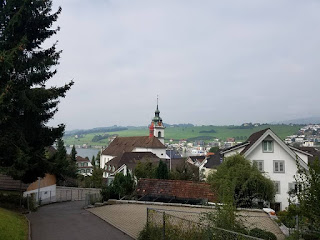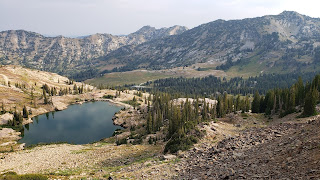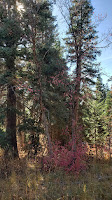Finding Peace Through Christ
Talk in Highland 26th Ward Sacrament Meeting on 11/29/2020
Intro: Peace is always available to us through the gospel.
About five years ago I came to acknowledge that I was pretty
seriously depressed. I won’t go into
details, but even though things seemed fine in my life on the outside, I could
find very little joy in life and faced emotional pain greater than I thought
possible. As this came on and grew I
thought that if I just served, prayed or studied hard enough I could feel the
spirit and I would feel better. I wanted
to do my part and have God make me feel better. But as I did those things I
didn’t feel better, at least not most of the time.
During all of this I might have asked, what about the
promise that “if we are righteous we will prosper in the land?” I know that all
of you have experienced your own moments of pain: sickness, financial setbacks,
losing loved ones, seeing friends or family turn away from the gospel,
etc… In those moments we feel very, very
far from prospering in the land. Of
course, we know in our heads that this promise only holds in general, say over
our whole lifetime, or over many people and over generations. But some of you are struggling and it may
seem that all of your blessings are being reserved for the next life. I have
some small idea what that feels like.
While I don’t have a formula to make sure that you always “prosper
in the land,” there is a similar promise that we are given that does hold in
almost every moment in life. In D&C
59:23, we read, “…he who doeth the works of righteousness shall receive his
reward, even peace in this world, and eternal life in the world
to come.” I believe that we can expect and
can find a measure of peace even in this troubled world and in the midst of
difficult trials through the gospel plan.
Peace from the
Atonement in the Midst of our Shortcomings
So how do we access that peace? What do we have to do? What if you are struggling with some huge
problem such as I just mentioned. Or what if you have an area in
which you have tried to change to beat some sin or addiction or weakness and
have slipped back and messed up over and over and over again. If you feel that then you are not alone. How can we have peace in the midst of that?
I think this is explained well in a story that Brad Wilcox
tells of counseling with a BYU student who was struggling to do all that she
felt she needed to do, and be all that she was expected to be, to the point
that she just wanted to give up.
She said, “I know I need to do my
best and then Jesus does the rest, but I can’t even do my best.”
She then went on to tell (Brad
Wilcox) all the things she should be doing because she’s a Mormon that she
wasn’t doing.
She continued, “I know that I have
to do my part and then Jesus makes up the difference and fills the gap that
stands between my part and perfection. But who fills the gap that stands
between where I am now and my part?”
She then went on to tell (Brad) all
the things that she shouldn’t be doing because she’s a Mormon, but she was
doing them anyway.
I think we all have or eventually will feel that sense of inadequacy. I’ve found that it often isn’t very
comforting to know that Jesus makes up the difference between my best efforts
and perfection, because I have no idea what my best efforts are anyway, and
even if I did I rarely seem to be able to give them. To help this girl understand, Brad took out a
piece of paper and drew two dots. One at
the top representing where God is, or perfection, and one at the bottom
representing where we are. The gap
between is all the sin and mistakes we have to overcome to be like him. Continuing the story, he asked the girl to
draw a line between our part and God’s part,
(Brad Wilcox) then said, “Go ahead.
Draw the line. How much is our part? How much is Christ’s part?”
She went right to the center of the
page and began to draw a line. Then, considering what we had been speaking
about, she went to the bottom of the page and drew a line just above the bottom
dot.
(Brad Wilcox) said, “Wrong.”
She said, “I knew it was higher. I
should have just drawn it, because I knew it.”
(He)
said, “No. The truth is, there is no line. Jesus filled the whole space. He
paid our debt in full. He didn’t pay it all except for a few coins. He paid it
all. It is finished.”
I really like that thought.
Christ’s atonement didn’t fill part of the gap, he paid ALL OF THE DEBT. There is nothing left for you to pay, no
minimum that you have to meet. No matter
how many times you mess up, and no matter how dark your sins, He has paid
them. Whatever you are feeling guilty about, he paid for that already.
Given the culture that we’ve grown up in, we tend to resist
this idea. We think, there must be some
catch, something that is required of us, something that we have to do. So what
is it?
In 3rd Nephi we read about the earthquakes and
fires and destruction that accompanied the death of Jesus Christ. After they were over the people sat in the
darkness and mourned their losses, they heard the voice of the Lord. That voice told them of Christ’s sacrifice
and began to explain what it meant to them.
It said,
19
And ye shall offer up unto me no more the shedding of blood; yea, your
sacrifices and your burnt offerings shall be done away, for I will accept none
of your sacrifices and your burnt offerings.
(In other words, those sacrifices that you
were making that you thought were to pay for your sins, you can stop them now. They were never really enough to pay for your
sins anyway, but were just symbols. I
want something different. ------ The scripture then continues to explain what
this is.)
20
And ye shall offer for a sacrifice unto me a broken heart and a contrite
spirit. And whoso cometh unto me with a broken heart and
a contrite spirit, him will I baptize with fire and with the Holy Ghost...
The way this makes sense to me is to say that the plan of grace
really comes down to your heart. Is your heart
pointed towards Christ? One nice thing
about this teaching is that you can change the direction of your heart in an
instant, and be reconciled with God and on the right path. Then peace can begin to be yours in that
instant, because you know that you are taking a step towards Him. There is no list of things you first have to
do. The debt is paid, and now you are a debtor to Him.
It
sounds so easy, right?
But this is a two-edged sword. If we were hoping that we could meet some
minimum requirement and get grace, then now that won’t work. We can’t cram the night before, the way we
would for a school assignment. We can’t
get there by doing things on a checklist, because we might do those things with
our hearts still pointed the wrong direction.
There isn’t a faceless, nameless agency holding our debt. It is now held by a person who paid it
personally and knows us, knows all the struggles and baggage we have to
overcome, but also knows what we are capable of as well as we do. Will we turn to him and offer him “a broken
heart and a contrite spirit?”
So what about works? We
spend 90% of our time in church talking about works – don’t they matter
too? And if so, how? I don’t have all of the answers, but for one,
I know that in my life sometimes the best way to get my heart pointed in the
right direction, is to move my feet in that direction! We’ve all had the experience of not wanting
to go to a church activity, or on a ministering visit, but we do it anyway and
come home grateful and blessed, more in tune with the Lord. We may think that those blessings come
because of something we did, but maybe the more important thing is that the
action just helped us to get our heart pointed in the right direction.
As I have tried to turn my heart to God, if I am honest I have to admit
that part of me still really does want to follow the world and not Christ. There is a lot of good in me, but part of me
still wants to continue in certain sins.
When I read that a “heart can be changed, so that it has no more desire
to do evil” I just feel more guilty because mine has not yet changed. I’m 44 years old, shouldn’t I be done
struggling with _____ (fill in your favorite sins) by now? What am I doing wrong?
So how does this relate to the story that I shared about my
depression. In the past 5 years I have
made some significant strides towards recovery.
I am coming to understand that feeling good is something that I need to
do for myself and not expect God to do. One thing I think of as a sort of
landmark on my path to recovery, was a time when I heard a choir sing “I Feel
my Savior’s Love” at a stake conference.
For several years, rather than help me to feel better, that song made me
more depressed because I wanted to feel His love, I was trying to do all the
things I was supposed to, but time and time again the spirit did not come to make
me feel better. I was still not “prospering
in the land.” I was focused on an
outcome and not the direction of my heart.
During that stake conference though, a different line stood out to
me. It was, “He
knows I will follow Him, give all my life to Him.” I realized that this one line was true and
through all of my ups and downs it always had been. I wanted to follow Him. I wanted to follow His plan, even if I kept
making mistakes or couldn’t figure out how to live some important parts of it
or couldn’t even find the desire to live some parts of it. In a way it was realizing that I could choose
in any moment to turn my heart to Christ, and that He would be there ready to
receive what I could give. That has brought a
measure of peace that is available in any moment, even if happiness isn’t
always within reach.
Turning our hearts to God is a real rollercoaster. Sometimes today’s best effort ends up being
worse than yesterday’s. Sometimes we forget and don’t really give much effort
at all. But,
through all of that we can know that each effort, each attempt to turn to Him
is worth something. That brings a measure of peace, no matter what the outcome. And, slowly, over the course of, say, a year,
or a decade, I can see myself growing closer to Christ, I can see the ways he
has helped me to do and be more, and I can begin to believe that with the Savior's
help it will be enough. Our best
efforts will always be enough, but more importantly, since we never really can
give our best efforts, our imperfect efforts are also enough. He has already paid the price for ALL of our
sins. All we have to do now is to keep trying to turn our hearts to God.
When Christ was resurrected, we
read in Mark 16:9 that the first person that he appeared to was Mary Magdalene,
a woman who was a former sinner, from whom he had cast out seven devils. Why her?
Women held very little power in Jewish society back then, so perhaps this was
to make a point about the worth of souls.
Perhaps, but I wonder if there was just something special about this
former sinner. Perhaps the unique
struggles she had, and the repentance that followed had made her heart more
prepared, more receptive to the Savior. Speaking
of a different sinner in Luke 7:47 Christ said, “…to whom little is forgiven,
the same loveth little.” But “…Her sins, which are many, are forgiven;
for she loved much.”

































